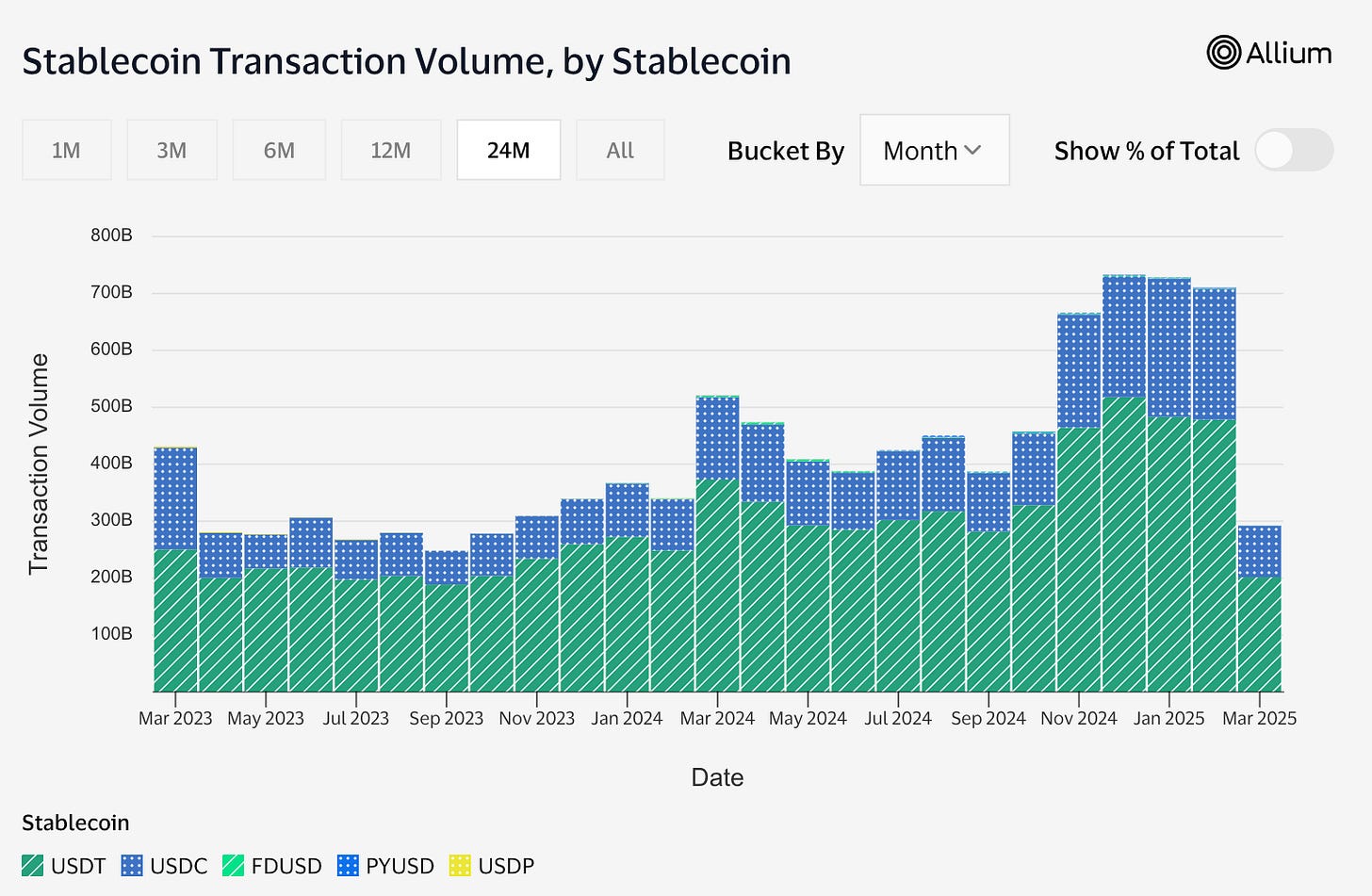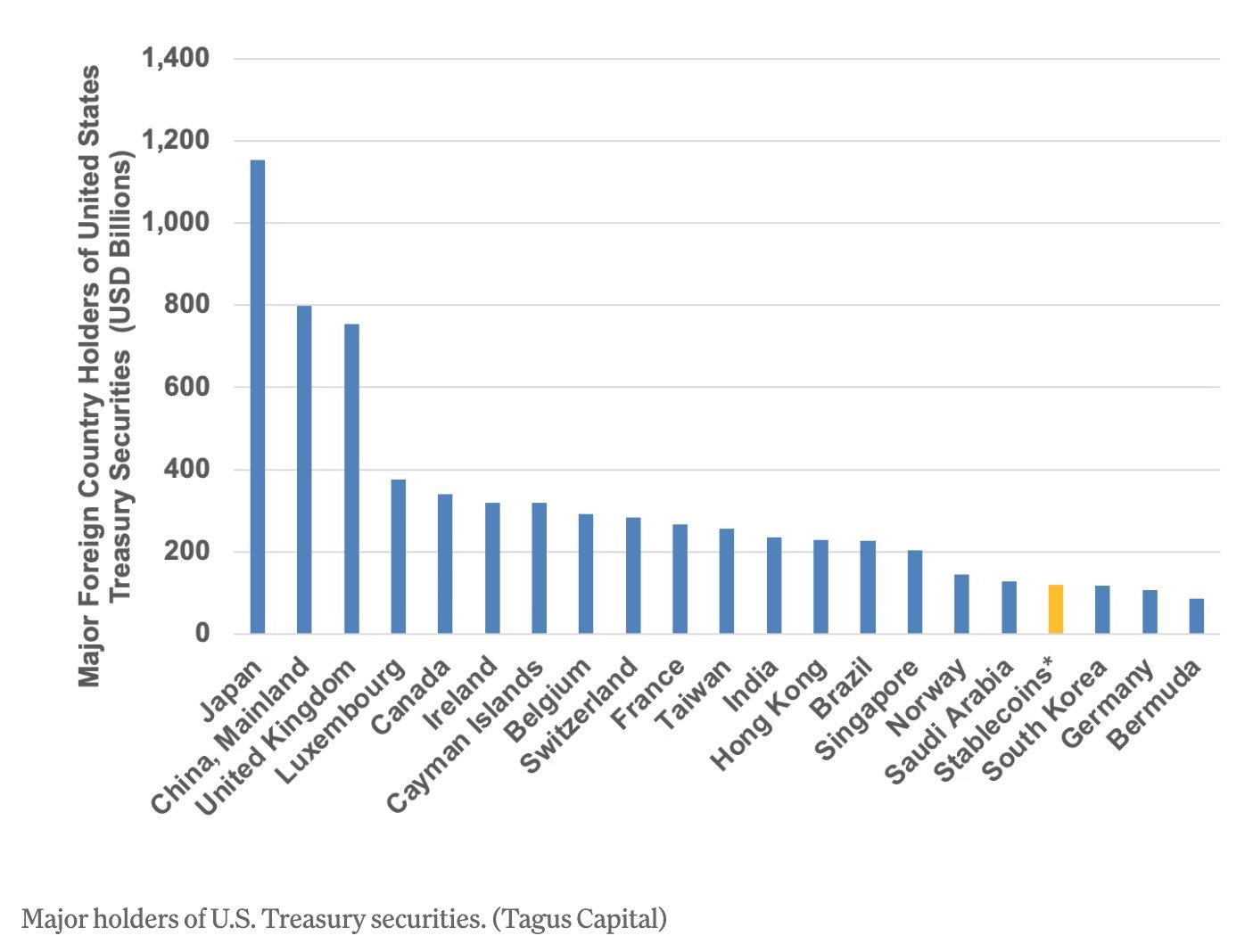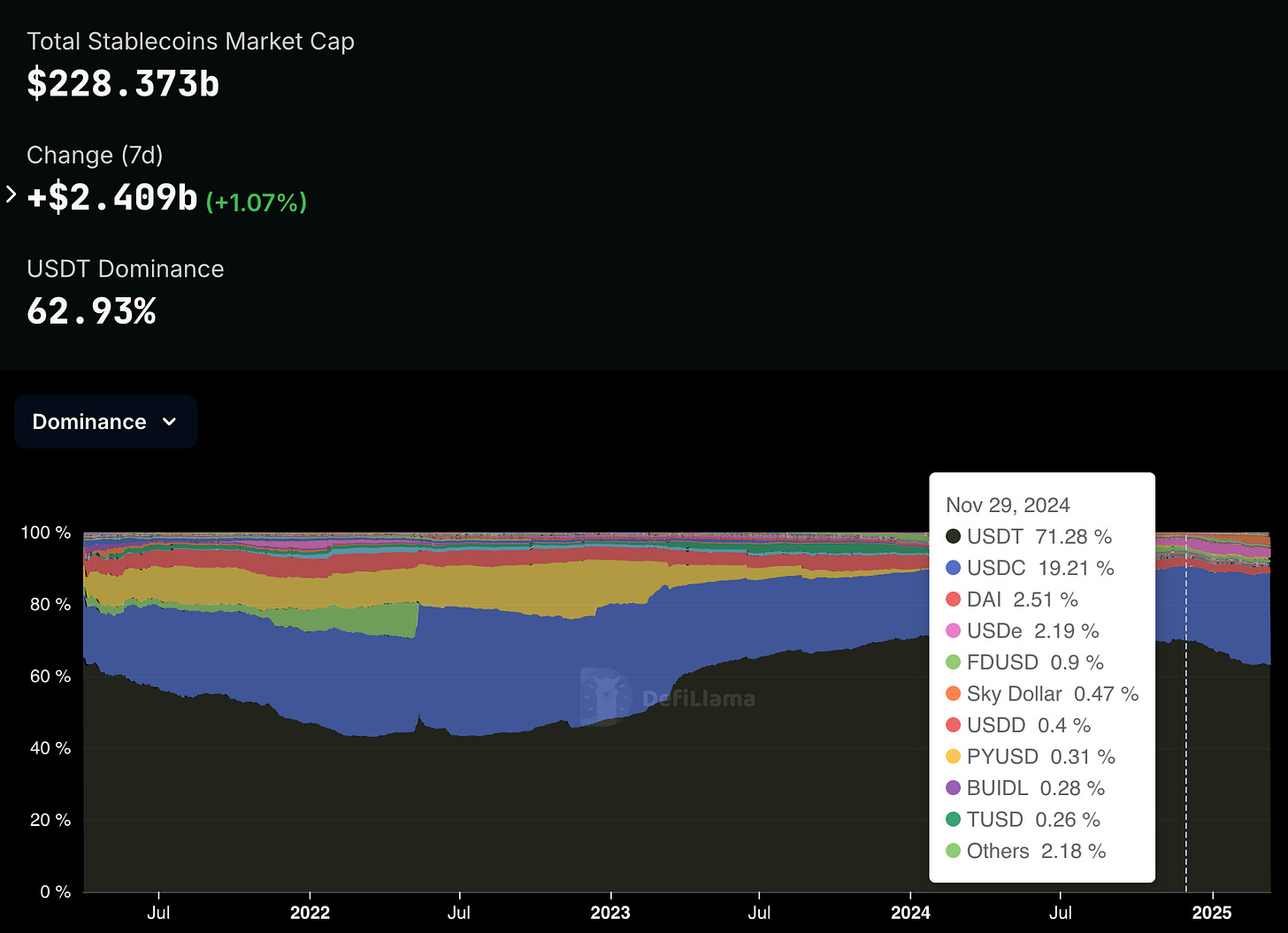How STABLE is the GENIUS Act? ⚖️
Trump vows to sign stablecoin bill by August. CBDC fears fuel urgency. US vs foreign issuers battle heats up. Will the two different stablecoin bills being considered be merged?
Busy fretting over Bitcoin reserve, the painful market meltdown and Bitcoin price volatility? We got something that could be crypto's first real win from US President Donald Trump’s White House - and that too without a single satoshi changing hands.
We're talking stablecoins. And the clock is ticking.
"I hope lawmakers will send that legislation to my desk before August recess if they can," Trump said at last week's White House crypto summit.
It was the biggest takeaway for us in a summit that otherwise lacked any big headline announcement.
What stands in the way is deciding on one of the two competing laws seeking to regulate the crucial stablecoin ecosystem.
The House held a hearing on Tuesday and the Senate is poised to vote on Thursday (March 13) on the updated Guiding and Establishing National Innovation for U.S. Stablecoins (GENIUS) Act, with the House's Stablecoin Tethering and Bank Licensing Enforcement (STABLE) Act already in progress.
More on these two Acts here: Stablecoin Debate: 2 Bills, 1 Mission 🤺
In today’s edition, we tell you how this stablecoin legislation might actually reshape crypto's future more profoundly than the debated Bitcoin reserve.
Stake Smarter, Stay Liquid – With Marinade Finance!
Why choose between earning staking rewards and keeping your SOL accessible? With Marinade Finance, you get the best of both worlds.
Stake SOL in seconds & earn rewards effortlessly
Stay liquid with mSOL—use it across Solana DeFi
Non-custodial & secure—your assets remain yours
Boost Solana’s security while maximising your yield
No lockups, no waiting—just smarter staking designed for flexibility and growth. Whether you're a DeFi pro or just getting started, Marinade makes staking seamless and rewarding.
Stake your SOL today with Marinade Finance!
Building a Stable Bridge
Stablecoins have been the bridge between traditional finance and the crypto world.
They have already processed over $1.43 trillion in total transaction volume in January and February this year, as against $5.62 trillion through 2024.
The relevance of stablecoins in the financial ecosystem - both centralised and decentralised - is growing by the day for the US. Precisely why even the American government cannot stay away from intervening with the regulations needed to guardrail the industry.
Get 17% discount on our annual plans and access our weekly premium features (HashedIn, Wormhole, Rabbit hole and Mempool) and subscribers only posts. Also, show us some love on Twitter and Telegram.
🎙 Block That Quote
Rep Bill Huizenga, said at Tuesday’s House hearing
"There is a moment for us here in Congress now to act, and as legislators, it's ultimately up to us to provide the regulatory clarity needed to ensure that the US dollar remains the dominant reserve currency, and I believe stablecoins can do that."
The urgency is about both crypto and America's financial dominance.
Treasury Secretary Scott Bessent made it clear at the White House crypto summit: "We are going to keep the US dollar as the dominant reserve currency in the world, and we are going to use stablecoins to do that."
The numbers back him up.
Stablecoin issuers collectively hold over $120 billion in US treasuries, making them the 18th largest buyer globally. That's bigger than the holdings of South Korea.
And that's exactly why this bill matters more immediately than a Bitcoin reserve. It's about cementing dollar hegemony in the digital age.
The CBDC Battleground
The stablecoin push isn't happening in a vacuum. It's a direct counter to something many crypto fans dread: Central Bank Digital Currencies.
On March 6, Rep Tom Emmer reintroduced the CBDC Anti-Surveillance State Act in the House of Representatives. Emmer renewed his call for Congress to pass the legislation at the March 11 hearing.
He called CBDCs "inherently un-American" and a threat to "the American way of life."
"This underscores why we must prioritise pro-stablecoin legislation alongside anti-CBDC legislation," Emmer argued.
President Trump has already signed an executive order prohibiting "the establishment, issuance, circulation, and use" of a CBDC in the US. Emmer's worried that might not be enough – a future administration could still build a digital dollar surveillance machine.
The solution? Private stablecoins with clear regulation.
It's a fascinating pivot for the GOP, from resisting financial oversight to championing it – as long as it's for private companies rather than government currencies.
Not everyone's buying it.
Jean Rausis from Smardex decentralised trading platform called the GENIUS bill "a CBDC trojan horse," arguing that "the government realises that if they control stablecoins, they control financial transactions."
Rausis feels the government will punish stablecoin issuers that do not comply with the new regulatory framework, similar to the European Union Markets in Crypto-Assets (MiCA) regulations.
"With stablecoins under the government's control, the result is the same, with the false veneer of decentralisation added as a bonus," Rausis warned.
What's in these two bills though?
The US vs Offshore Divide
The GENIUS Act is doing more than dividing politicians. It's creating a chasm in the stablecoin industry as well.
Circle (USDC) and Ripple (RLUSD) are poised to win big, while offshore issuers like Tether might be facing an existential threat.
Why?
The latest draft adds stricter requirements for foreign issuers, including
More rigorous reserve requirements
Monthly liquidity reporting
Stronger anti-money laundering provisions
Tighter sanctions compliance
"The bill seems to favour US-based stablecoins, potentially sidelining Tether (USDT)," crypto commentator pkeane13 said in a post on X.
Jeremy Hogan, partner at law firm Hogan & Hogan, was more direct.
"The reserve requirements, anti-money laundering requirements, all fall neatly for RLSUD and USDC," Hogan posted on X.
Translation? American issuers are ready for these rules. Foreign ones, not so much.
That's a direct shot at Tether, which dominates the stablecoin market with $143 billion in circulation – more than twice Circle's USDC - the second most dominant issuer.
Tether’s already feeling the heat - with its dominance down more than eight percentage points to 62.93% from 71.28% less than four months back.
The Political Showdown
Democrats didn’t hold back their criticism either.
Senators Elizabeth Warren, Andy Kim, and Jack Reed plan to introduce seven amendments targeting national security concerns – including one that would explicitly "forbid such stablecoins from being offered to US users."
Rep. Maxine Waters criticised Trump’s motives targetting his memecoin launch: "Despite my belief that the Trump administration only wants crypto legislation that personally benefits them and protects their crypto financiers — I still hope we can work together."
The deepest fault line? How much surveillance should be built into stablecoins.
Rep. Sean Casten worried about stablecoins becoming "a backdoor for the bad actors," while Rep. Warren Davidson countered that "in a state of nature, people can transact. The government isn't the giver of the right to transact."
It's the eternal crypto tension: innovation versus regulation, privacy versus security.
Token Dispatch View 🔍
So, what's really at stake? What does all this mean for crypto beyond stablecoins?
The stablecoin bill is crypto's regulatory test case. If this passes, it creates momentum for the market structure bill that would clarify Bitcoin and other tokens.
Success here means Trump's crypto-friendly promises aren't just talk. It means real policy change.
And for everyday users? Regulated stablecoins provide a safe entry point into crypto without the volatility. They're the bridge that could finally bring millions of traditional finance users into the digital asset ecosystem.
Let's be clear: The STABLE GENIUS Act isn't perfect. It favours US issuers, potentially weaponises dollar dominance, and gives regulators significant control over what was supposed to be a decentralised ecosystem.
Yet it's also the first step toward bringing crypto from the fringes into the financial mainstream. If the price of admission to the big leagues is tighter rules on stablecoins, the trade-off might be worth it. Clear regulation means institutional money, mainstream adoption, and the legitimacy crypto has sought for years.
"We want to make sure we have the same set of rules in the US as we have around the world so that there isn't some arbitrage that is possible to issue from another jurisdiction," said Charles Cascarilla, Paxos CEO, at Tuesday's hearing.
That will precisely be the long game - a global stablecoin standard with America at the centre.
The STABLE GENIUS Act won't make headlines like a Bitcoin reserve. It won't pump prices overnight. It might just build the foundation for everything that comes after.
Dollar-pegged rails that connect TradFi to DeFi. Clear rules that attract institutional billions. A competitive edge that keeps innovation in America.
All by August – if Congress can pull it off.
Worth watching a lot more closely than Bitcoin price charts this spring, no?
Token Dispatch is a daily crypto newsletter handpicked and crafted with love by human bots. You can find all about us here 🙌
If you want to reach out to 200,000+ subscriber community of the Token Dispatch, you can explore the partnership opportunities with us.
Disclaimer: This newsletter contains sponsored content and affiliate links. All sponsored content is clearly marked. Opinions expressed by sponsors or in sponsored content are their own and do not necessarily reflect the views of this newsletter or its authors. We may receive compensation from featured products/services. Content is for informational purposes only, not financial advice. Trading crypto involves substantial risk - your capital is at risk. Do your own research.















Stablecoins are getting so much attention (and rightfully so) -- think they're going to continue to be one of the most significant narratives over the next few years.